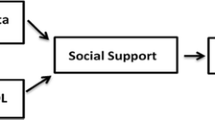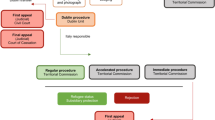Abstract
This qualitative study explores the welfare recipients’ experiences of and attitudes toward the welfare benefit system in Hong Kong. A sample of 19 welfare recipients from six main recipient groups was interviewed, some twice. This study finds that the recipients have strong aspirations to exit the welfare benefit system. The welfare application process is painful; they are strongly stigmatized; they do not have sufficient resources to meet many of their expected needs; and, after all, they have strong ethos for self-reliance. However, they remain in the benefit system. This study looks into this paradox and the challenges facing the welfare benefit system in Hong Kong in terms of providing ontological security on the one hand and promoting self-reliance on the other.
Similar content being viewed by others

Notes
According to the Census & Statistics Department, there were 6,925.9 thousand population in mid-2007 and 2,251.5 thousand households in the period 12/2007 and 12/2008 in Hong Kong. Accessed to http://www.censtatd.gov.hk/hong_kong_statistics/statistics_by_subject/index_tc.jsp on 2 June 2008; all figures of CSSA were downloaded from the Social Welfare Department website: http://www.swd.gov.hk/en/index/site_pubsvc/page_socsecu/sub_comprehens/. Accessed on July 7, 2007.
The amount of HK$3,487, being the average CSSA payment in the financial year of 2006–2007 was obtained from the Social Welfare Department; while the median monthly employment earnings in June 2006 were from the Census and Statistics Department.
References
Bailey, M. A. (2005). Welfare and multifaceted decision to move. America Political Science Review, 99(1), 125–135.
Campbell, A., & Sawer, W. (1976). Life satisfaction in the United States. Social Forces, 54(3), 621–631.
Census and Statistics Department. (2007). Thematic report: Household income distribution in Hong Kong. Hong Kong: Government Logistics Department, The Special Administrative Region Government of Hong Kong.
Chan,Y. K., Kwan, C. C., & Shek, D. (2003). Quality of life in Hong Kong—The Chinese University of Hong Kong quality of life index. Hong Kong: The Chinese University of Hong Kong.
Chau, R. C., & Yu, W. K. (2005). Is welfare unAsian? In A. Walker & C. Wong (Eds.), East Asian welfare regimes in transition (pp. 21–45). Bristol: Policy Press.
Cheung, C. K. (1998). Impacts of class on Hong Kong people’s well-being. Human Relations, 51(1), 89–119.
Chiu, S., & Wong, V. (2005). Hong Kong: From familistic to Confucian welfare. In A. Walker & C. K. Wong (Eds.), East Asian welfare regimes in transition. Bristol: Policy Press.
Choi, K. S. (2000). The image of comprehensive social security assistance clients in printed media in Hong Kong. Hong Kong Social and Cultural Quarterly, No. 5 (in Chinese).
Clasen, J. (1997). Social insurance in Europe. Bristol: The Policy Press.
Clasen, J., & Clegg, D. (2003). Unemployment protection and labour market reform in France and Great Britain in the 1990s: Solidarity versus activation? Journal of Social Policy, 32(3), 383–401.
Cocca, C. (2002). From “welfare queen” to “exploited teen: Welfare dependency, statutory rape, and moral panic. NWSA Journal, 14(2), 56–79.
Cox, R. H. (1998). The consequences of welfare reform: How conceptions of social rights are changing. Journal of Social Policy, 21(1), 1–16.
Dean, H., & Taylor-Gooby, P. (1992). Dependency culture: The explosion of a myth. London: Oxford University Press.
Deng, R., & Zhou, C.-x. (2006). The dependence on social welfare in current China and the implementation of the policies to go against such dependency. Journal of Guizhou University (Social Sciences), 24(6), 82–86.
Diener, E., & Diener, C. (1996). Most people are happy. Psychological Science, 7, 181–185.
Diener, E., Emmons, R. A., Larsen, R. J., & Griffin, S. (1985). The satisfaction with life scale. Journal of Personality Assessment, 49, 71–75.
Diener, E., Suh, E. M., & Oishi, S. (1997). Recent findings in subjective well-being. Indian Journal of Clinical Psychology, 24(March), 25–41.
East, J. F., & Bussey, M. (2007). “I was scared every day”: Surviving in the TANF environment. Journal of Policy Practice, 6(3), 45–64.
Edin, K., & Lein, L. (1998). Making ends meet, how single mothers survive welfare and low-wage work. New York: Russell Sage Foundation.
Engbersen, G., Schuyt, K., Timmer, J., & van Waarden, F. (1993). Cultures of unemployment: A comparative look at long-term unemployment and urban poverty. Boulder, CO: Westview Press.
Fernandez, R., & Kulik, J. (1981). A multilevel model of life satisfaction: effects of individual characteristics and neighborhood composition. American Sociological Review, December, 840–850.
Hagerty, M. R. (1999). Unifying liveability and comparison theory: Cross-national time-series analysis of life satisfaction. Social Indicators Research, 47, 343–357.
Halvorsen, K. (1998). Symbolic purpose and factual consequences of the concepts of “self-reliance” and “dependency” in contemporary discourses on welfare. Scandinavian Journal of Social Welfare, 7, 56–64.
Hernanz, V., Malherbet, F., & Pellizzari, M. (2004) Take-up of welfare benefits in OECD countries: A review of the evidence, OECD social. Employment and Migration Working Papers, 17.
Hills, J., & Waldfogel, J. (2004). A “third way” in welfare reform? Evidence from the United Kingdom. Journal of Policy Analysis and Management, 23(4), 765–788.
Hong, S. M., & Giannakopoulos, E. (1994). The relationship of satisfaction with life to personality characteristics. The Journal of Psychology, 128(5), 1–8.
Hoynes, H., & MaCurdy, T. (1994). Has the decline in benefits shortened welfare spells? American Economic Review, 84(2), 43–48.
Inglehart, R. (2000). Globalization and postmodern values. The Washington Quarterly, 23(1), 215–228.
Jones, R. M. (1995). The price of welfare dependency: Children pay. Social Work, 40(4), 496–505.
Keng, S.-H., Garasky, S., & Jensen, H. H. (2002). Welfare dependence and recidivism in an era of welfare reform. Applied Economics, 34, 2311–2323.
Kenworthy, L. (1999). Do welfare policies reduce poverty? A cross-national assessment. Social Forces, 77(3), 1119–1139.
Kerr, S. A. (1983). Making ends meet. London: Bedford Square Press.
Kimenyi, M. S. (1991). Rational choice, culture of poverty, and the intergenerational transmission of welfare dependency. Southern Economic Journal, 57(4), 947–960.
Kittay, E. F. (1998). Welfare, dependency, and a public ethic of care. Social Justice, 25(1), 123–145.
Krueger, L. W., & Neumann, W. L. (2006). Social work research methods: Qualitative and quantitative applications. Boston: Pearson.
Lau, S. K., & Kuan, H. C. (1988). The ethos of the Hong Kong Chinese. Hong Kong: The Chinese University Press.
Li, M.-G. (2008). Municipal minimal living security system and the poor’s welfare dependency. Social Work, No. 2, 24–27. (in Chinese).
McGarry, K. (1996). Factors determining participation of the elderly in supplementary security. Journal of Human Resources, 31(2), 331–358.
Mendes, P. (2007). An Australian perspective on Singaporean welfare policy. Retrieved from Monash University, Australia on 23 March 2009 http://www.socwork.net/2007/1/articles/mendes.
Misra, J., Moller, S., & Karides, M. (2003). Envisioning dependency: Changing media depictions of welfare in the 20th century. Social Problems, 50(4), 482–504.
Monroe, P. A., Tiller, V. R., O’Neil, C., & Blalock, L. L. (2007). “We make our ends meet good”: Coping strategies of former welfare reliant women. Journal of Loss and Trauma, 12, 199–221.
Neale, B., & Flowerdew, J. (2003). Time, texture and childhood: the contours of longitudinal qualitative research. International Journal of Social Research Methodology, 6(3), 189–199.
Niskanen, W. (1996). Welfare and the culture of poverty. Cato Journal, 16(1), 1–15.
Ring, P. J. (2005). Security in pension provision: A critical analysis of UK government policy. Journal of Social Policy, 34(3), 343–363.
Rubin, A., & Babbie, E. R. (2005). Research methods for social work. Pacific Grove: Brooks/Cole.
Scheider, S. K., & Jacoby, W. G. (2003). A culture of dependence? The relationship between public assistance and public opinion. British Journal of Political Science, 33, 213–231.
Scott, E. K., London, A. S., & Gross, G. (2007). “I try not to depend on anyone but me’: Welfare reliant women’s perspectives on self-sufficiency, work, and marriage. Sociological Inquiry, 77(4), 601–625.
Social Welfare Department. (1998). Support for self-reliance: Report on review of the comprehensive social security scheme. Hong Kong: Government Printer.
Sofaer, S. (1999). Qualitative methods: What are they and why use them? Health Service Research, 34, 1101–1118.
Tang, K. (2000). Social welfare development in East Asia. Houndmills: Palgrave.
Tang, K. L., & Cheung, C. K. (2007). Programme effectiveness in activating welfare recipients to work: The case of Hong Kong. Social Policy and Administration, 41(7), 747–767.
Underlid, K. (2007). Poverty and experiences of insecurity—a qualitative interview study of 25 long-standing recipients of social security. International Journal of Social Welfare, 16, 65–74.
Veit-Wilson, J. (1998). Setting adequacy standards. Bristol: Policy Press.
Walker, A., & Wong, C. K. (2005a). Introduction: East Asian welfare regimes. In A. Walker & C. Wong (Eds.), East Asian welfare regimes in transition (pp. 3–20). Bristol: Policy Press.
Walker, A., & Wong, C. K. (2005b). Conclusion: from Confucianism to globalisation. In A. Walker & C. Wong (Eds.), East Asian welfare regimes in transition (pp. 213–224). Bristol: Policy Press.
Wijeysingha, V. (2005). The welfare regime in Singapore. In A. Walker & C. Wong (Eds.), East Asian welfare regimes in transition (pp. 187–211). Bristol: Policy Press.
Wong, C. K., & Chau, K. K. L. (2002). Neither welfare state nor welfare society: The case of Hong Kong. Social Policy and Society, 1(4), 293–301.
Wong, C. K., & Wong, K. Y. (1998). Assessment of social welfare conditions in Hong Kong, challenges facing the “self-reliance for welfare” mentality. Hong Kong: Hong Kong Institute of Asia–Pacific Studies, Chinese University of Hong Kong, Occasional Paper 86 (in Chinese).
Wong, C. K., Wong, K. Y., & Mok, B. H. (2006). Subjective well-being, societal condition and social policy—the case study of a rich Chinese society. Social Indicators Research, 78, 405–428.
Acknowledgments
The paper is partially based on the unpublished report of a consultancy study. We are grateful to our client for giving us permission to cite from the report.
Author information
Authors and Affiliations
Corresponding author
Rights and permissions
About this article
Cite this article
Wong, CK., Lou, V.WQ. “I Wish to be Self-Reliant”: Aspiration for Self-Reliance, Need and Life Satisfaction, and Exit Dilemma of Welfare Recipients in Hong Kong. Soc Indic Res 95, 519–534 (2010). https://doi.org/10.1007/s11205-009-9524-8
Accepted:
Published:
Issue Date:
DOI: https://doi.org/10.1007/s11205-009-9524-8



